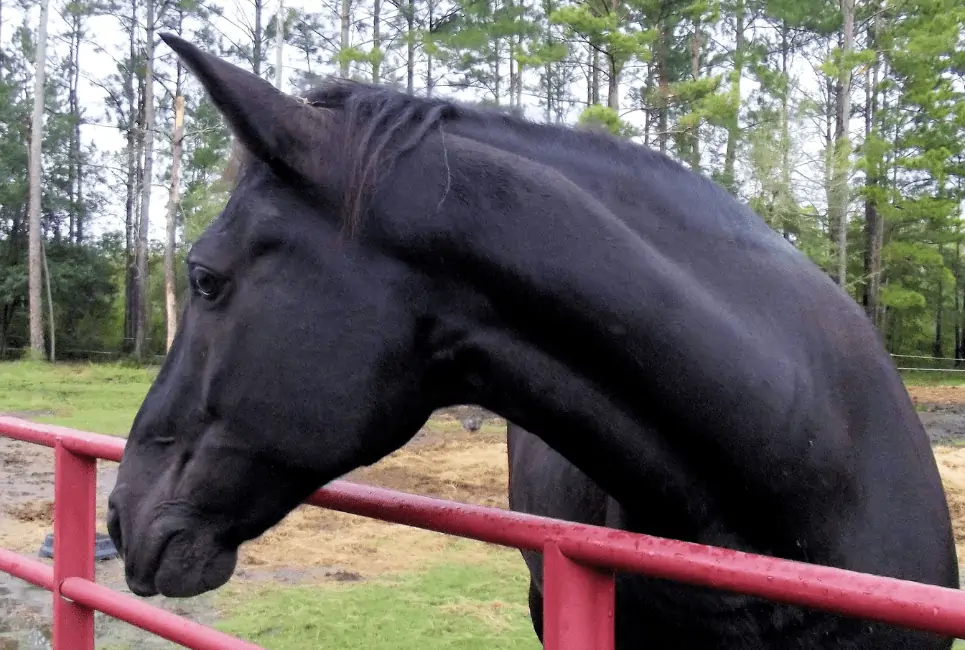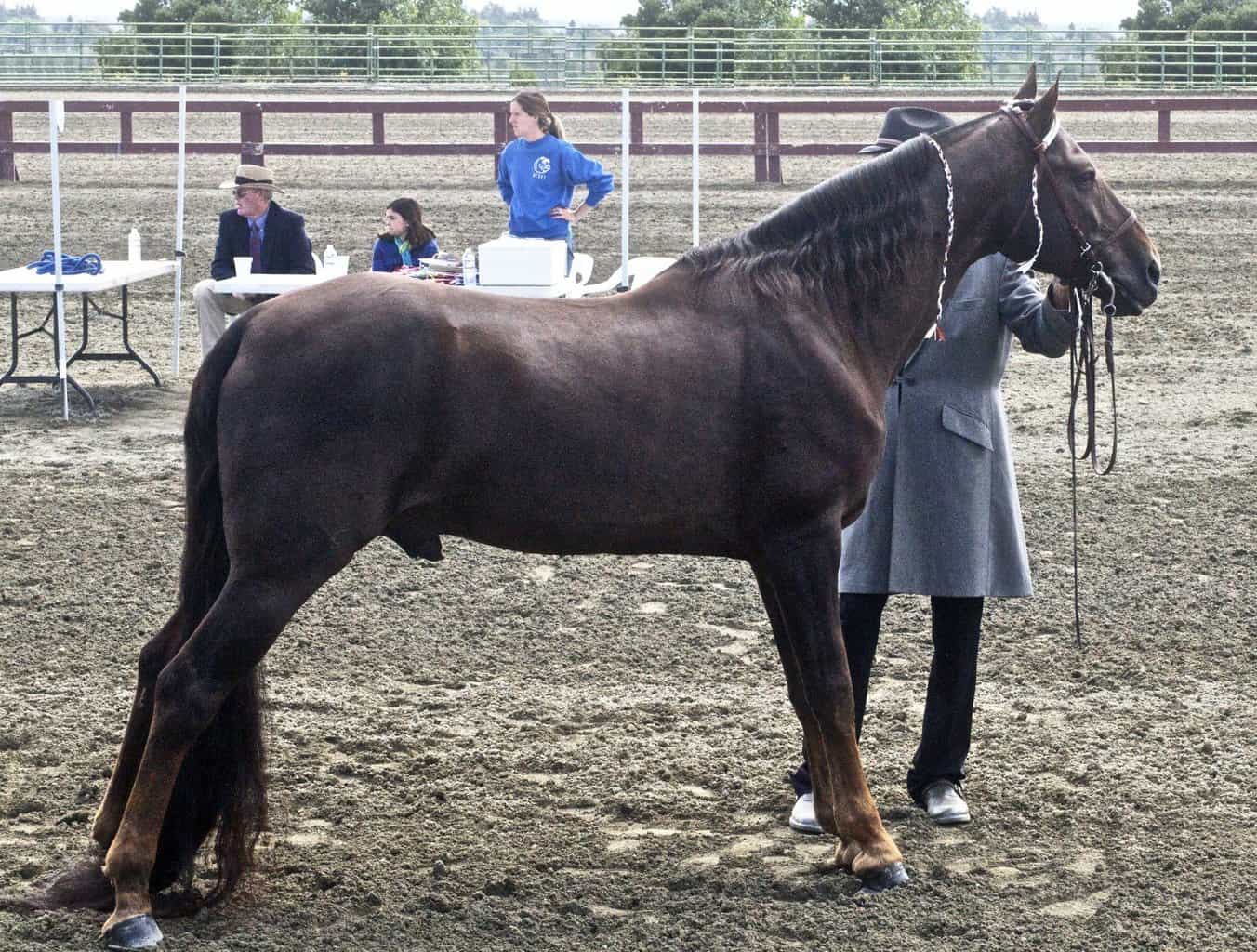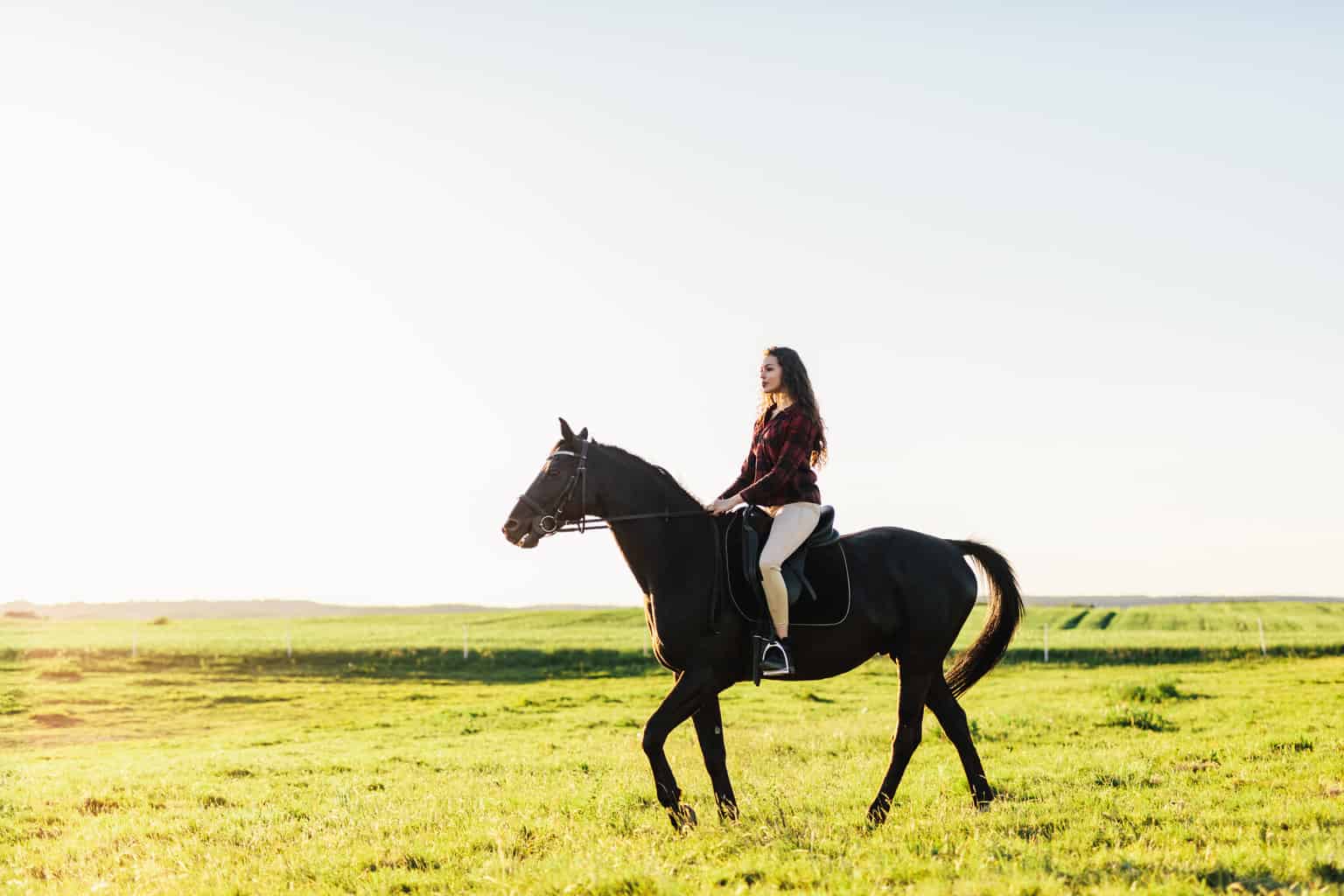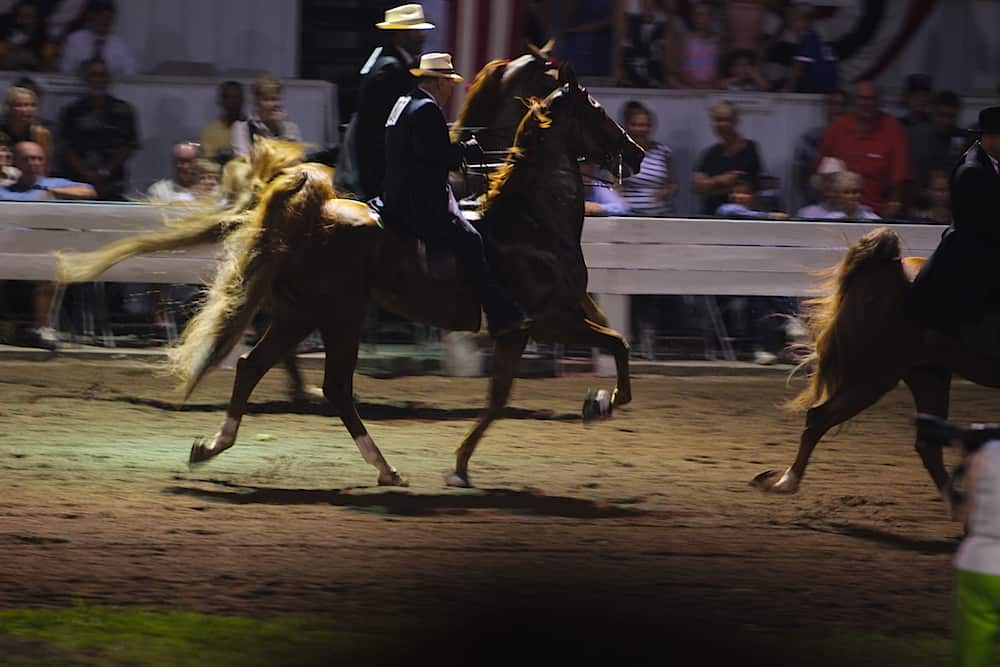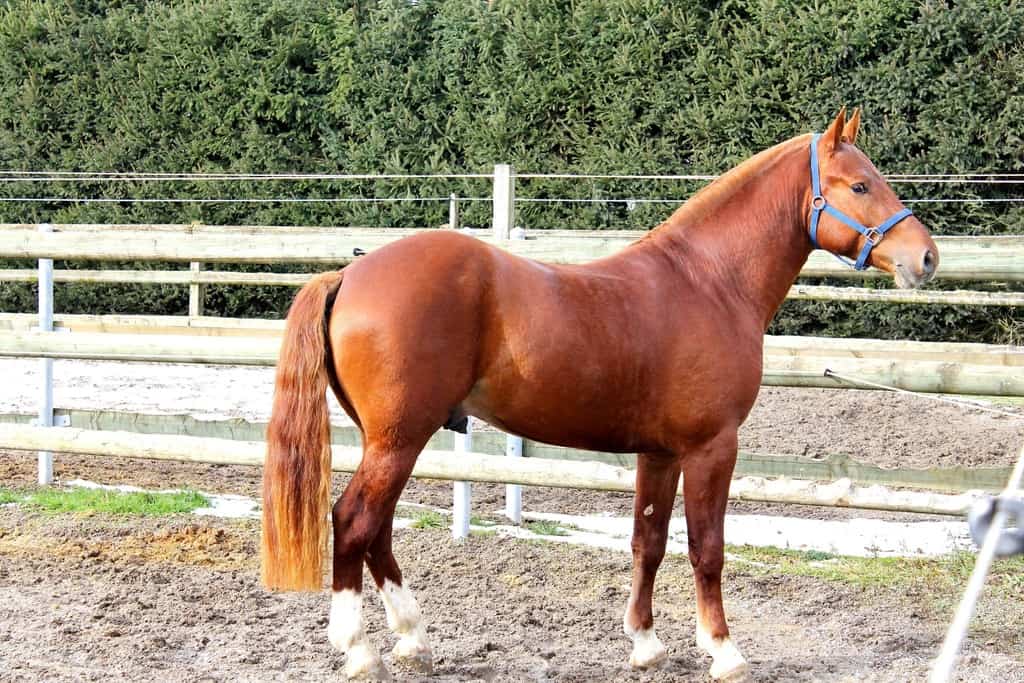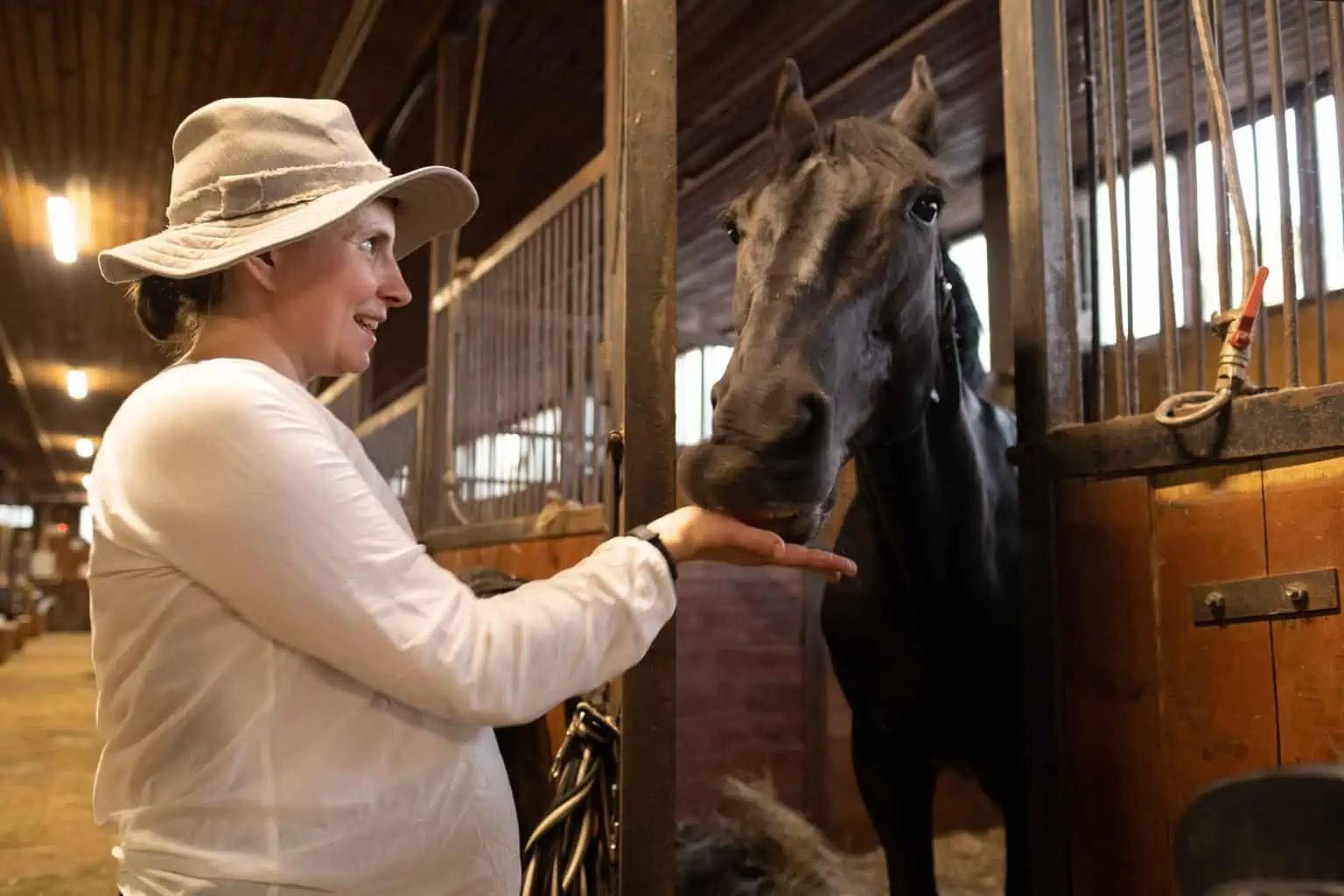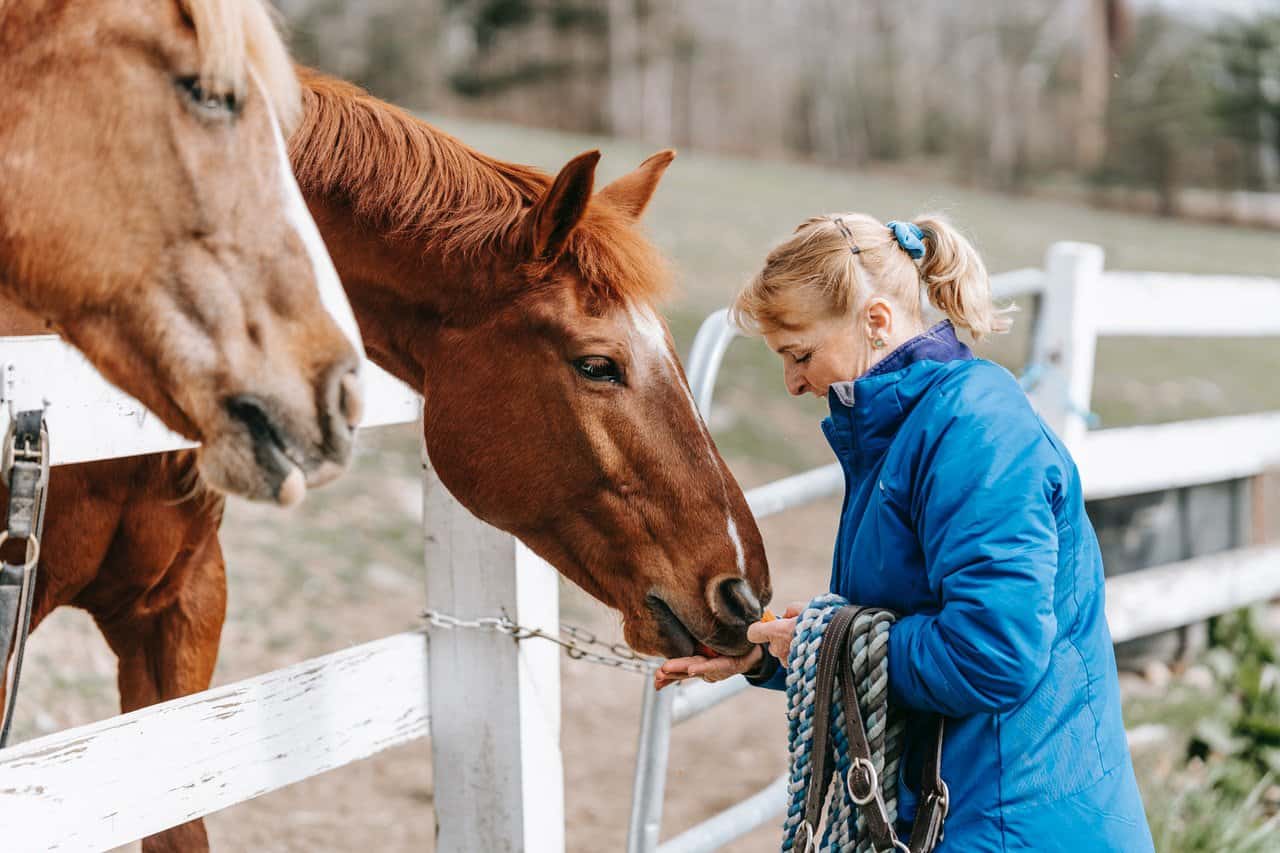- Best Horse Show Halters Guide - July 13, 2022
- Best Bareback Pads Guide - July 5, 2022
- Best Western Bitless Bridle Guide - July 3, 2022
- Tennessee Walking Horse Quick Facts
- Tennessee Walking Horse At A Glance
- How to Identify a Tennessee Walking Horse
- Tennessee Walking Horse Controversy
- Tennessee Walking Horse Lifespan
- Tennessee Walking Horse Appearance and Variety
- Tennessee Walking Horse Human Interaction and Training
- Tennessee Walking Horse Diet
- Tennessee Walking Horse Breeding
- Tennessee Walking Horse Cost
- Where To Buy a Tennessee Walking Horse
- Famous Tennessee Walking Horses
- The Future of the Walker
- Tennessee Walking Horse Guide: FAQs
Are you looking for a smooth ride? Are you looking to get around in style? Look no further than the gated Tennessee Walking Horse. Tennessee walkers are the pride of Tennessee, right up there with Jack Daniels and Elvis Presley.
Elvis Presley used to own a whole stable of Tennessee walkers. He would ride down to the gates of Graceland to show off their smooth gates to waiting fans.
Today, Priscilla Presley champions the breed and keeps the stable at Graceland full of walkers. Their legacy may be fairly young about other horse breeds, but it’s a rich and stylish one. If you’ve ever been to a Tennessee Walker exhibition, you know exactly what I’m talking about. They are bred to please, adding style and flash to the horse world.
Tennessee Walking Horse Quick Facts
- Horse Family: Gated saddle
- HorseBreed: Tennessee Walking Horse
- Common Names: Tennessee Walker, Walker
- Country of Origin: United States
- Height: 16-17 Hands
- Weight: 1100 lbs
- Color: Black, chestnut, bay, roan, gray, palomino, paint, buckskin, and pure white
- Coat Quality: Short and shiny
- Body Hair: Mane and tails are kept long and well-groomed
- Temperament: Very mild-mannered, great beginner horses
- Lifespan: Up to 30 years
- Purpose: Trail riding, endurance riding, showing, side-saddle
Tennessee Walking Horse At A Glance
The Tennessee Walker is predominantly known for its running walk gate. The four-beat gate allows the horse and rider to travel at speeds up to 20 miles an hour without breaking into a canter or trot. While all Tennessee Walking horses can canter, many cannot trot and perform this gate instead.
The Tennessee Walker is also able to learn other complicated gates, but the running walk is what’s featured in the show ring. Tennessee walkers can be anywhere from 14.3 to 17 hands.
They have sloped shoulders, larger heads, and smaller hind ends relative to other horses of their size, giving them the overall appearance of sloping downwards from nose to tail. They are overall very agreeable horses and excel outside of the show ring as comfortable trail horses.
Unfortunately, the breed has been plagued with abuse. Putting very heavy shoes (or “stacking” pads) on the front feet is common practice to show Tennessee walkers in “Performance” classes. Trainers may also artificially set their horse’s tails so that the horse carries it high in the air.
They accomplish this by either using a brace while outside of the ring to stretch the tail tendons or cutting the tendons and allowing them to grow back with the brace on. Lastly, even though it is very much considered cheating, trainers of Tennessee Walkers have been known to practice a technique called soring.
They puncture their horse‘s front feet with tiny holes, then cover them with a caustic chemical, such as diesel fuel or mustard oil. This also causes the horse to throw their feet high in the air in “performance” classes in a move called the “Big Lick”.
How to Identify a Tennessee Walking Horse
If you can see the horse in action, their running walk gate will be the first clue that you’re dealing with a Tennessee Walking Horse. If you watch closely, the gate is performed by the back feet overlapping the front feet’s hoofprints.
The larger the overlap, the smoother the gate and the more valued the Walker. In contrast, a trot would demonstrate the back feet either behind or touching the front feet’s footprints. You’ll also notice the rider barely moves in their seat while riding the running walk.
If you are unable to see the horse in action, you’ll recognize a Tennessee Walker by its massive head! Relative to horses of the same size, Walkers have large, long heads, sloped shoulders, and small hindquarters.
The combination makes them look like the low riders of horses, with the flashy action upfront. They can come in nearly any color, and their mane and tails are kept long. They tend to carry their tail high in the air, even if their owners have not artificially braced it.
Tennessee Walking Horse Controversy
Have you ever heard of soring? If you’re in the Tennessee Walking Horse community you certainly have. Soring is the practice of using harsh chemicals like diesel fuel or mustard oil on a Tennessee Walker’s front feet and then piercing their hooves with sharp objects to allow the chemicals to seep in.
This applied lameness makes them throw their feet high into the air in a movement called “The Big Lick”. The technique has been used since Americans started showing Tennessee Walkers.
It may seem insane that this technique is still in use, but there are currently entire events for showcasing The Big Lick. Judges continue to reward The Big Lick movement, meaning trainers will still use soring to achieve it. The breed’s championship, The Tennessee Walking Horse Celebration, even lost their Jack Daniel’s sponsorship due to the practice.
To be fair, soring is cheating at The Tennessee Walking Horse Celebration, and it could be very few trainers that still practice the technique.
Congress is currently trying to ban the practice with the Prevent All Soring Tactics or PAST act, though there is considerable push back. It remains ineffective not from a lack of interest in preventing soring but from the government’s failure to consult experts to craft it. Most major Tennessee Walking Horse groups oppose the bill, though they may not oppose soring.
While soring may be front and center in the bill, Tennessee Walking horse trainers have a long history of abuse tactics that also need to be addressed in addition to its current language being problematic. The bill must also include a ban on tail braces and ankle chains.
Until judges reward more natural movement or congress bans it, trainers will continue to turn to abuse to create more valuable horses for their stables.
Tennessee Walking Horse Lifespan
Tennessee Walkers have a lifespan of up to 30 years. This is a pretty average lifespan for a medium-sized horse. Tennessee walkers are relatively healthy horses with few issues. They do often suffer from Congenital Stationary Night Blindness, but this is a mostly harmless disorder as long as it is diagnosed. Horses that suffer from night blindness appreciate a light left on in their paddock or stable.
The most common health issues that Tennessee Walking horses deal with correlate to human causes. Trainers often show Walkers with extra, heavy pads on their front shoes. This “stacking” makes the horse raise its feet even higher than the breed’s natural movement in its walking gate. Similar to humans wearing incorrect shoes, this can lead to back problems, leg problems, and lameness.
Tennessee Walking Horse Appearance and Variety
Talk about a stylish horse! Tennesse Walkers are all about glamour. Their long manes and tails are just as shiny and impressive as their coats.
When it’s showtime, ribbons are tied in their manes and high set tails. The combination of their natural beauty and the cruising nature of their famous gate gets all the fans at a show on their feet. Take it from someone that has been to every discipline of horse show: no one can quite match the energy of a Tennessee Walking horse crowd.
Walkers come in a wide array of colors. Black, chestnut, bay, roan, gray, palomino, paint, buckskin, and pure white can be registered. The most important thing is their confirmation and their unique gate. There are a few very similar breeds to the Tennessee Walking horse, such as the Saddlebred or the Rocky Mountain horse.
Their confirmation is slightly different, but the best way to tell them apart is the Tennessee Walker’s signature running walk.
Tennessee Walking Horse Human Interaction and Training
Tennessee Walking horses are the third most popular breed in America, and it’s due to their trainability and willingness to please. They are sought-after horses for children, lessons, and therapy. In addition, their good nature and comfortable gate make them well suited to trail riding and endurance riding.
There is no training required to experience their signature run-walk gate. The gate usually replaces Walker’s trot. With some training, you can usually teach a walker to trot as well, if that interests you.
Walker’s don’t require constant attention or training. They can also be wonderful pasture companions and enjoy a sedentary lifestyle.
Tennessee Walking Horse Diet
Tennessee Walkers need a vitamin, carbohydrate, and protein-rich diet when showing or trail riding. Endurance Walkers also need a high-calorie, high-fat diet. High-fat diets have been proven as the most efficient energy source to burn for endurance horses.
You will also need to supplement electrolytes for long-distance trail rides so that your Walker does not become dehydrated. A constant supply of fresh, clean water and plenty of forage options are still the most important aspects of a performance horse’s diet.
Less active Walkers do well with a high fiber, high forage diet. Feed them treats in moderation, they can become overweight with a high-calorie diet. Tennessee Walkers are known for their laid-back, “more whoah than go”, personalities.
Tennessee Walking Horse Breeding
The Tennessee Walker is a young breed (as far as horse breeds go) that originated in Tennessee in the 19th century. Blue Ridge Mountain settlers wanted a horse that could work their farm but was also a comfortable ride under-saddle.
For strength, they chose Morgans for their breeding program, and for size and speed, they added thoroughbreds. To get the Tennessee Walkers’ signature running walk, they bred in Saddlebreds, Canadian Pacers, and Narragansett Pacers.
Early Americans created a ranch horse that was comfortable transportation. While very few people still use Walkers for farm work, they excel at trail and endurance trail riding due to their Morgan and Thoroughbred roots.
Tennessee Walking Horse Cost
Tennessee Walkers are the third most popular breed in the United States, and as a result, can be extremely affordable. You may pay as little as $1000 for a Walker, or even find one for adoption. For a well-trained trail Walker, you can expect to pay $5000 and up. The show horses can be wildly expensive but start at around $10,000.
Many horses are crossed with the Tennessee Walker. Make sure to either first-hand witness their gates, or have a video of them moving through gates if the running walk is important to you. Just because a horse has Tennessee Walker blood does not mean it will be able to gate easily. Some crosses will only be able to gate under very experienced riders.
Where To Buy a Tennessee Walking Horse
Online marketplaces are great places to buy beginner-friendly and trail riding Tennessee Walkers and Walker crosses. You may also have great luck with a breed-specific rescue and adoption off of social media. Walker personalities are so laid-back, and the breed is so popular that finding a good trail or lesson horse won’t be expensive or difficult.
If you are looking to show Tennessee Walking Horses, you’ll need to start meeting with reputable breeders. Be cautious when choosing a breeder. With the rampant questionable showing practices that plague the breed, you will want to verify how your breeder show’s their horses.
It is always a good idea to attend a show that your prospective breeder is participating in, but it’s a must when choosing a Tennessee Walker breeder.
Famous Tennessee Walking Horses
The most famous Tennessee Walker may be the most famous horse of all. Though it may not be a well-known fact, Roy Roger’s horse Trigger Jr. was a palomino Walker stallion. The original Trigger was also suspected to be a Tennessee Walker mix.
Roy Rogers had both stuffed, and they were displayed at the Roy Rogers – Dale Evans museum for many years. Eventually, the entire museum was sold at auction, and Trigger Jr is likely in a private home or company lobby somewhere.
The most famous Tennesee Walking horse outside of Hollywood is the breed’s horse of the century and multiple grand champion Midnight Sun. He is the breed’s leading sire, and it is speculated that 90% of Walkers can trace back to him.
Midnight Sun was from a reputable sire but passed over by many influential barns and trainers of the time as a gangly and unremarkable colt. It took Henry Davis, a huge name in the Tennessee Walker community or “the father of the celebration” to spot the colt’s potential.
He recommended him to Harlinsadale Farm and they turned him into the most influential Tennessee Walker of all time. There were only three grand champions in the 20th century that were not of Midnight Sun’s lines.
The Future of the Walker
There’s no doubt about it; the Tennessee Walker is a regal and unique breed. They excel in many disciplines, and their laid-back nature makes them ideal for any level rider. As the third most popular breed in the United States, there will be no shortage of Walker lovers any time soon, right?
Unfortunately, unless the community can come up with a solution for the growing concern over their “performance” showing practices, we may see a decrease in the breed’s popularity. Tennessee Walkers are predominantly in the news for controversy at this point, and the leading organizations need to enact some changes or be left by the times.
This breed has a lot to offer in the show ring that doesn’t have to involve stacked shoes, soring, tail bracing, or ankle chains. To their credit, the most brutal of these activities are banned, but steps will need to be implemented to enforce these bans.
Tennessee Walking Horse Guide: FAQs
Answer: There are cruel practices involved in Tennessee Walker classes, but not all classes and events. Tennessee Walking organizations have banned the worst of them but have failed to enforce these bans. If you are interested in supporting a Tennessee Walker activity but concerned about abuse, try the “flat-shod” category. The “performance” category standards encourage the most modifications or downright abuse.
Answer: All sorts of things! Walkers excel at trail riding and endurance riding. Their smooth second gate, the running walk, makes for a comfortable and sustainable way to cover ground quickly. You may also choose to show your Walker, use it for beginner riders, or even as a therapy horse.
Answer: Walkers are relatively inexpensive horses. A good trail horse can be easily found for $5000, especially when shopping locally or looking at rescues. A young, well-bred, and flashy Walker will cost around $10,000. Accomplished Walkers or those with elite bloodlines can get much more expensive.
Answer: The Walker derives the first part of its name from its state of origin: Tennessee. The second part of their name refers to their unique running walk. This gate was bred into them from a combination of other Walkers and Saddlebreds. It is meant to be exceptionally smooth for the rider while quickly and efficiently covering many miles.
Answer: No. Not even close. Tennessee Walkers are the third most popular breed. Even when the abuse was legal, only a small percentage of horses were affected. With the PAST act, most forms of Tennessee Walker abuse are illegal, but it needs to be more often enforced.
Tennessee Walkers are one of the best breeds for beginners. Don’t be put off by their large size; they are gentle and easy for beginners to handle.
Research Citations
- Tennessee Walking Horse Breeders’ and Exhibitors’ Association
- Britannica – Tennessee Walking Horse
- The Spruce Pets – Tennessee Walking Horse

